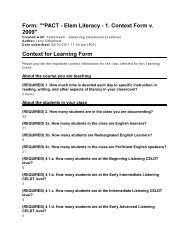The Tutoring Book - California State University, Sacramento
The Tutoring Book - California State University, Sacramento
The Tutoring Book - California State University, Sacramento
You also want an ePaper? Increase the reach of your titles
YUMPU automatically turns print PDFs into web optimized ePapers that Google loves.
Reading Out Loud<br />
As tutors, we don’t want to miss any opportunity of improving the writing of the student. Many students<br />
catch their own mistakes when reading aloud. During every session, if a paper is read out loud, in addition<br />
to a student catching his own mistakes, he will be working on speaking clearly. Talking out loud and<br />
asking questions will help the student put together his own sentences and learn by listening to the way the<br />
tutor speaks to him. I had a student whose sentence structures rarely made sense. <strong>The</strong> positive thing was<br />
that he never spoke the way he wrote. He spoke in full sentences missing just a couple of words.<br />
Whenever I came across sentences like these, I turned them around into questions and had him answer it<br />
out loud. For instance, he wrote, “To stay safe on MySpace, you should put age 99, location, add<br />
strangers, put pictures private.” I would ask, “I am going to make a MySpace. What can I do to stay<br />
safe?” He would answer slowly and in short sentences, but they were not run on sentences when he spoke.<br />
I would quickly start writing down what he said word for word. When I showed him what he spoke<br />
versus what he wrote, he agreed that writing something down was a problem he faced. I suggested that he<br />
ask himself what he wants to write in a sentence, and then answer that question out loud while writing the<br />
answer down. He is currently working on editing in this manner and shows much improvement.<br />
Making an Outline<br />
ESL students at many times have problems with development. <strong>The</strong>y have a topic and know what side<br />
they are on, but don’t know how to turn that topic into a 3-4 page paper. One way to help an ESL student<br />
is to ask him many questions while going through his essay. When a student has to explain everything, he<br />
is forced to think about ways to expand his ideas. If he had a good idea written down on paper, asking<br />
numerous questions shows him what his reader needs to see more of in his paper. In future papers, he<br />
would find it easier to clarify many ideas because he gets used to explaining one thing in many different<br />
ways. By asking questions, the tutor not only shows interest but also challenges the student, which makes<br />
the student a better writer as well as a better speaker. Asking questions leads to new ideas. If one has a<br />
weak thesis for a paper, he can make it strong by answering a variety of questions the tutor asks. If this<br />
process is followed for all papers, the student will become a strong writer on his own through continuous<br />
writing.<br />
Focus on Higher Order Concerns First<br />
It’s always helpful to educate the student about higher order concerns first since they need to be able to<br />
structure their paper before structuring their sentences correctly. <strong>The</strong> structuring may be something new<br />
to a foreign student since writing styles are different in different countries. If a tutor provides them with a<br />
handout of the basic structure of an essay, it can be used by the student for future papers. Students who<br />
are new to the academic writing structure are not likely to get it the first time. <strong>The</strong>refore, it is important<br />
that they are given something to reference.<br />
Take it One Step at a Time<br />
Most importantly, be aware that if this is your first time being with an ESL student, it is normal to be<br />
frustrated. <strong>The</strong>y need help in many areas, and at most times, it is not in our control to help them with<br />
everything in a 30 minute or one hour session. You are just one source through which they will learn a<br />
few things to carry on into their future writings. It is not the tutor’s responsibility to make a student a<br />
perfect writer by the end of the semester. It is our responsibility to make sure that we are steering the<br />
student in the right direction, that we are not just helping them to get a passing grade on one paper, but to<br />
make them good writers in one small area or another.<br />
---------- ---------- ----------<br />
We might remember that multilingual writers are not only trying to acquire academic writing<br />
skills but that they are also struggling with the threat of loss of identity by forgoing the style of writing<br />
106

















